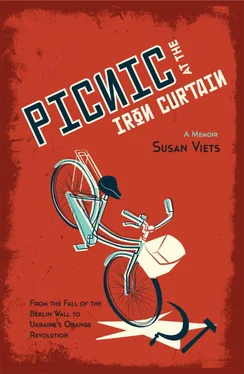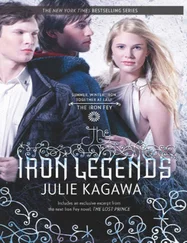This woman, Yulia Tymoshenko, fascinated me. She and Yushchenko operated as a team. Yushchenko was the statesman. Yulia had drive and popular appeal, even though some people hated her and pointed to her questionable past in the gas industry. It had made her very rich. Slender Yulia was also beautiful. She rose to power as a deputy prime minister and was then briefly held in jail on charges of forging documents and smuggling gas but was released and cleared of the charges.
Yushchenko, the statesman, and Yulia were temperamentally so different that I could not understand how they even got along. But they were as good as married in the public eye as they fought together for new presidential elections.
I watched Yulia stride through the restaurant in a snug orange sweater. Her hair was tightly braided and wrapped around her head in her trademark halo hairdo. She exuded such energy. I imagined lightning might flash from Yulia at any moment. Fascinated, I stared as she visited the men at other tables. Then she sat with the man in the orange jacket at the table next to us. We all tried to eavesdrop. Yaroslav had the best spot for that.
When a crackdown had seemed imminent, Yulia helped inspire more protest. It had happened a few nights earlier. Marta and I returned home from a late dinner, astonished when we saw no people in the square. Our friend Nadezhda crossed it in the distance. We shouted out to her and met up in the centre.
“Yushchenko and Yulia told everyone to block the presidential administration and the Council of Ministers, so they all left,” Nadezhda said.
Marta went home. Nadezhda and I investigated. We went on a midnight stroll to the presidential administration.
“Do you think Yulia’s braid is real?” I asked Nadezhda as we walked up the hill.
“My friend’s grandmother loves that braid. It reminds her of villages in the Carpathians,” Nadezhda said. Neither of us could decide if the long blonde plait that Yulia wrapped around her head was real or a hairpiece. Near the top of the hill, we forgot about the braid, faced again with a massive crowd. As we penetrated farther into it, I saw no other women.
We pushed and jostled our way to the front of the crowd and reached a human blockade. It stretched one very long block deep, from the main intersection, down Bankova Street, past the Writer’s Union to the presidential administration. Young guys stood, arms linked, stretched across the street, tens, if not hundreds of rows deep, illuminated by the yellow glow of streetlights.
“Let us through, we want to see what’s happening,” Nadezhda shouted at one of the guys.
He shook his head, “No one’s allowed past.”
“We’re accredited journalists,” Nadezhda insisted. She pulled out her press card.
The young man shook his head again, “It’s too dangerous.”
“What’s going on?”
“The order’s been given to send troops in,” he said. I saw no troops, but this militant atmosphere and mood of grim determination signalled major change.
“Nadezhda!” someone shouted. We turned and saw six young guys, one a distant relative of hers, all from out of town and camped in her living room.
“Tell your friends to let us through,” she fumed. They apologized but refused. The well-organized blockade held firm. Nadezhda relented.
We walked in the other direction, toward the Council of Ministers building, a few blocks away. I checked my watch under a streetlight — 1:25 a.m.
We heard drummers before we reached the building. They lined a leafy park embankment across the street. Their beat sounded like a celebration.
“Why is everyone so happy?” I asked a group of smiling young women outside the Council of Ministers building.
“They’ve pulled back the troops,” one of them yelled over the sound of the drums. It was tense back there but a party here. I wondered whose information was correct.
One thin line of students guarded the building. I bumped into an American acquaintance who was still working in Kiev. Well-connected and a trustworthy source, she confirmed that troops had been pulled back.
In the morning, Marta and I woke late and rushed half a block down the road to the tent city. One of Marta’s colleagues from the National University of the Kyiv-Mohyla Academy planned to let us in. Guards who surrounded the camp perimeter stopped us. They stood on slabs of Styrofoam, which insulated their feet from the cold. They dispatched a student to find Marta’s colleague. She arrived and vouched for us. The guards stamped our hands and let us through.
The tent city was long and stretched down several blocks of Khreshchatyk. We entered the Kyiv-Mohyla section, near Independence Square. Students operated in shifts that lasted from three to ten hours. A donation of large tents had just arrived. Everyone discussed how best to pitch them and looked forward to better conditions.
“We’ll be able to stand,” one of the students enthused as we hunched close together under the low roof of a pup tent. “Heaters should fit inside.” Already damp and a little chilled at minus 3 degrees Celsius, I became nearly as excited as him. As we left, a student who passed by us thrust squares of Styrofoam into our hands.
“Stand on them,” he ordered Marta and me, “or else you’ll come down with the flu.” We moved on, handed our Styrofoam to a cold-looking nineteen-year-old, and then bumped into the cough drop and vitamin brigade.
“Please, save them for others, we’re just visiting,” I insisted. The two young women — more determined than us — shovelled cough drops and vitamins into our pockets and waited until we swallowed some.
“Illness is a big problem for us,” Marta’s colleague explained. “They’re taking every precaution to keep people healthy.”
“Only a dozen people showed up today,” one of the students said. “Some of us have been out here for ten days. We’re getting tired and sick. We need a break.”
Others worried about falling behind in their studies. I thought of Senad in Sarajevo and how he had said the siege had cheated him of time. Corrupt as the election here might have been, I felt thankful these students would not face war.
As we spoke, I heard the clang of metal hitting pavement. I turned and saw a crew that shovelled garbage. Marta and I said goodbye and walked a short distance away from Independence Square, down Khreshchatyk and farther into the camp, in the direction of the Bessarabskyi Market. We met some young women outside a tent, who offered us tea and orange candies.
Refreshed, we continued our walk. We passed by a huge orange-coloured Christmas tree and a prayer tent that also contained sacks of food and then reached a building identified as command headquarters. A sign that said Do Not Enter was posted on it. We could go no farther, so we turned back and moved toward Independence Square. Soon we reached a Styrofoam wall.
“What’s beyond this?” I asked one of the students.
“Headquarters for another section of the camp,” he said. We had reached the end of Kyiv-Mohyla territory. It was well organized, with a military-like structure.
Marta and I were in her apartment when we heard the good news. She monitored TV broadcasts while I worked on Toronto assignments in the kitchen. She shouted, “Susan, they’ve done it. The Supreme Court ruled in favour of a repeat election.”
“The square!” I yelled back. I had already pulled on my coat and boots.
“Go ahead without me,” Marta said, scribbling furiously in her notebook, “I want to hear the rest of this newscast, then I’ll join you.”
I emerged from her courtyard into a street packed with people. One man beamed and then shouted “There is a God!” People streamed into the square. I joined them, buoyed by all the energy and excitement.
Читать дальше












